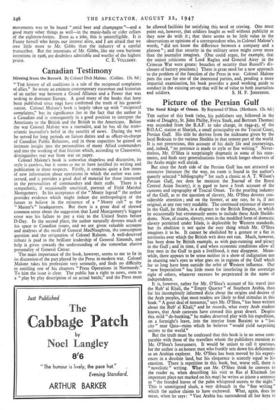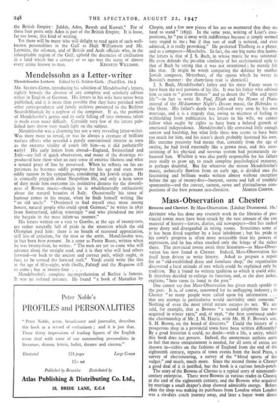Picture of the Persian Gulf
The Sand Kings of Oman. By Raymond O'Shea. (Methuen. 12s. 6d.) THE author of this book (who, his publishers say, followed in the wake of Doughty, St. John Philby, Freya Stark, and Bertram Thomas) was seconded from the R.A.F. to take charge, in 1944-45, of the B.O.A.C. station at Sharjah, a small principality on the Trucial Coast, Persian Gulf. His title he derives from the nickname given by the local Bedouin to the various Sheikhs in that remote part of the world. It is not pretentious, this account of his daily life and journeyings, and, indeed, "no pretence is made to style or fine writing." Never- theless, Mr. O'Shea is surprisingly dogmatic in some of his state- ments, and finds easy generalisations from which longer observers of the Arabs might well shrink.
But since the Arab side of the Persian Gulf has not attracted an extensive literature (by the way, no room is found in the author's queerly selected " bibliography " for such a classic as A. T. Wilson's Persian Gulf, nor does he mention the Journal of the Royal Central Asian Society), it is gqod to have a fresh account of the customs and topography of Trucial Oman. To the pearling industry of the Gulf, as to the question of slavery, Mr. O'Shea devotes con- siderable attention ; and on the former, at any rate, he is, if not original, at any rate very readable. The continued existence of slavery in the Gulf, he thinks, is a disgrace to the British Empire, in which he occasionally but erroneously seems to include these Aral, Sheikh- doms. Now, of course, slavery, even in the modified form of domestic slavery permitted under Islam, is deplorable by Western standards, but its abolition is not quite the easy thing which Mr. O'Shea imagines it to be. It cannot be abolished by a gesture or a fiat in territories over which the British writ does not run. Much, however, has been done by British example, as with gun-running and-piracy in the Gulf ; and in time, if and when economic conditions allow all free men in the Gulf to gain a livelihood, it may disappear. Mean- while, there appears to be sense neither in a show of indignation nor in shutting one's eyes to what goes on in regions of the Gulf which for so long have been outside the orbit of Western influence. Our " new Imperialism " has little room for interfering in the sovereign right of others, whatever excesses be perpetrated in the name of independence.
It is, however, rather for Mr. O'Shea's account of his travel into the Rub' al Khali, the " Empty Quarter " of Southern Arabia, than for his incompletely informed dicta about the origins and desires of the Arab peoples, that most readers are likely to find stimulus in this book. " A great deal of nonsense," says Mr. O'Shea," has been written about the Rub' al Khali," and he records, what every Arab student knows, that Arab caravans have crossed this great desert. Despite this mild "de-bunking," he makes deserved play with his expedition, on a fortnight's leave, into the interior from Baraimi to a " lost city " near Qara—ruins which he believes " would yield surprising secrets to the world."
But the truth must be confessed that this book is in no sense com- parable with those of the travellers whom the publishers mention as Mr. O'Shea's forerunners. It would be unjust to call it spurious, for the author is an honest man who frankly sets down his deficiencies as an Arabian explorer. Mr. O'Shea has been moved by his experi- ences in a desolate land, but his eloquence is scarcely equal to his emotion. There is repetition in this book, but, worse still, there is " novelistic " writing. What can Mr. O'Shea think he conveys to the reader as, when describing his visit to Ras al Khaimah (an important place not marked on.his map) he writes so jejune a sentence as " the fronded leaves of the palm whispered secrets to the night." This is unmitigated slush, a very debauch in the "fine writing" which the author claims to have eschewed. What, again, does he mean, when he says : " Vast Arabia has surrendered all her keys to the British Empire: Jiddah, Aden, Basrah and Kuwait." For of these four ports only Aden is part of the British Empire. It is loose, far too loose, this kind of writing.
Yet there will be many who will delight to read again of such well- known personalities in the Gulf as Hajji Williamson and Mr. Lermitte, the oil-man, and of British and Arab officials who, in the inhospitable region of the Gulf, uphold the decencies of civilisation in a land which but a century or so ago was the scene of almost



































 Previous page
Previous page